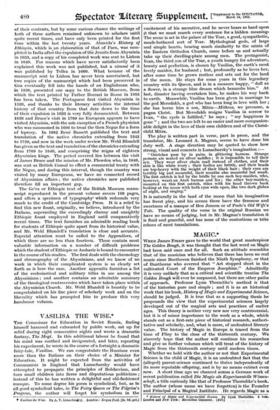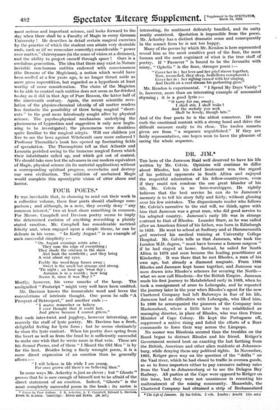MAGIC.*
WHEN James Frazer gave to the world that great masterpiece The Golden Bough, it was thought that the last word on Magic had been said once and for all. Such an attitude resembles that of the musician who believes that there has been no real music since Beethoven finished the Ninth Symphony, or that of Bunthorne who averred that " Art stopped short in the cultivated Court of the Empress Josephine." Admittedly it is very unlikely that as a critical and scientific treatise The Golden Bough will ever be surpassed, but there are other paths of approach. Professor Lynn Thorndike's method is that of the historian pure and simple ; and it is as an historical work that his book, History of Magic and Experimental Science, should be judged. It is true that as a supporting thesis he propounds the view that the experimental sciences largely developed out of the magical arts and practices of earlier ages. This theory is neither very new nor very controversial, but it is of minor importance to the work as a whole, which stands out as a first-rate piece of historical research, authori- tative and scholarly, and, what is more, of undoubted literary value. The history of Magic in Europe, is traced from the time of Pliny to the close of the thirteenth century. We sincerely hope that the author will continue his researches and give us further volumes which will treat of the history of Magic from the thirteenth century until modern times.
Whether we hold with the author or not that Experimental Science is the child of Magic, it is an undoubted fact that the (alleged) parent-science continued to thrive independently of its more reputable offspring, and is by no means extinct even now. A short time ago we chanced across a German work of recent publication Called Die Magic als Experimentelle Wissen- schaft, a title curiously like that of Professor Thomdike's book. The author (whose name we have forgotten) is the Founder and Principal of a Magical Institute. He regards Magic as a • Hibtora of Magic and Experimental &imam. By Lynn Thoindike. 2 vols. London and New York : Macmillan Company. [$10.] most serious and important science, and looks forward to the day-when there shall be a Faculty of Magic in every German University ! He describes in detail certain magical exercises by the practice of which the student can attain very desirable ends, such as (if we remember correctly) considerable " power over matter," clairvoyance (in the sense of vision at a distance), and the ability to project oneself through space ! Ours is a credulous generation. The idea that there may exist in Nature invisible non-human entities endowed with consciousness (the Demons of the Magicians), a notion which would have been scoffed at a few years ago, is no longer thrust aside as mere gross superstition, but regarded as a hypothesis at least worthy of some consideration. The claim of the Magician to be able to control such entities does not seem as far-fetched to-day as it did in that Age of Pure Reason, the latter half of the nineteenth century. Again, the recent scientific reve- lation of the physico-chemical identity of all matter renders less fantastic the possibility of there being magical "short- cuts " to the goal more laboriously sought after by physical science. The psycho-physical mechanism underlying the phenomena of hypnotism and suggestion is only now begin- ning to be investigated; the phenomena were doubtless quite familiar to the magical adepts. Will our children yet live to see the laws against Witchcraft once more enforced ? Professor Thorndike's book has opened up fascinating fields of speculation. The Theosophists tell us that Atlantis and Lemuria perished owing to the immense magical forces which their inhabitants called up, and which got out of control. We should take care lest the advances in our modern equivalent of Magic, physical science (in its material application) without a corresponding spiritual progress, overwhelm and destroy our own civilization. The addition of unchained Magic would complete this apocalyptic vision of utter chaos and horror.



































































 Previous page
Previous page